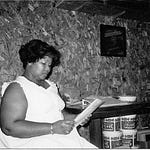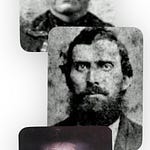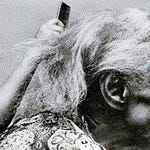When I was twenty, a fellow college student convinced a group of us fraternity brothers to gather in a motel room. There, he pitched us on an opportunity he claimed would make men out of all of us. Real winners. We could make a fortune. The proposition? The company he worked summers for would send us a thousand miles away from home, drop us into an unfamiliar territory, hand us a set of books to sell door-to-door, and expect us to work eighty hours a week for the summer. We could only bring $70, intended to cover a week of sales school. This, he assured us, was an incentive to get out of bed. We would work or starve.
Everybody had the good sense to walk out but me. The idea sounded like a godsend, like joining a modern-day foreign legion. It was a chance to leave home and return as someone entirely different, someone who had escaped the insecurities that had plagued me my entire life. Even as a child I had dreamed of a special summer camp for sissies and klutz’s, an opportunity to catch up with everyone else who seemed to know all the important things I didn’t – like playing sports and the mysteries of sex and the art of fitting in with other boys. At my camp no one would be allowed to laugh at you. By college, these feelings of isolation persisted. I was attracted to men and terribly shy, with a stutter that only heightened my self-consciousness, but this summer quest seemed like the perfect way to overcome my fears. I figured if I was I was forced to knock on a stranger’s door, I would eventually have to say something; and if I did it for 16 hours a day, I might even get good at it. I would return home a self-confident man with a lot of money. A real winner.
I was told that in sales school, they would teach me everything I needed to be successful: how to answer objections, where to stand on doorsteps, how to discourage dogs, hitch rides, find cheap lodging, and fix a flat tire. But what truly sold me was the idea of the "sales pitch." It was a word-for-word script I could memorize, eliminating the need to be spontaneously charming, clever, or assertive. And when I recited from memory, I didn’t stutter. I was a good student, after all, and this seemed learnable. It certainly beat spending another summer disassembling chickens in my dad's poultry plant.
After a week in Nashville practicing our sales talk and learning to survive on pennies a day, they shipped us off to our assigned territories. My roommate and I were sent to Johnston County, North Carolina. As we crossed the county line, a billboard of a medieval knight on a horse greeted us: “Welcome to Johnston County. Home of the Klan.” There was even going to be a rally this week at the Holiday Inn. Boy! I thought Mississippi was bad. We rented a room from a local widow and began knocking on doors.
The first part of the summer, we sold dictionaries and Bibles to white families. I did well, making money and gaining confidence. My stutter was gone. But it was too good to last. We exhausted our territory with two months left in the summer.
At the same time, the company was launching a new product: the Ebony Pictorial History of Black America in three volumes. At a sales meeting at the Ramada, our district manager told us we'd now be "selling to colored people." We started laughing. Everyone thought it was a joke. We were a bunch of white boys, after all. We didn’t go into Black homes. And everybody knew Black people didn’t have any money.
He insisted that selling these books would be like taking candy from a baby, since this was the first set of Black history books available to a mass market. He said it was easy to sell to Black people. “They always say ‘yes’ to whites and will sign anything.” The challenge, he said, was collecting the $32 from them at the end of the week. So, this time around, our training was not on selling, but how to get money from people who didn’t have it.
The sales meeting featured a role-play with student sales managers in blackface, which was deemed hilarious by the white kids from the Deep South.
What they didn’t teach us was how to win over the local white folks in “The Home of the Klan” when they found out what you were selling books that portrayed Black people in a positive light. How to answer the question, “What’s a white boy like you doing with these things?” Back in my home state just a couple of years earlier, the police could arrest you for disturbing the peace if they found stuff like this in your car.
We bought county maps at the courthouse and asked the clerk to mark where all the Black people lived, telling her we wanted to make sure to avoid those areas. She was eager to help. When whites saw us going into Black homes, we told them we were selling insurance, would they be interested? That usually shut them up.
But early on, someone must have complained. A deputy sheriff pulled me over, insisting that I show him the contents of my sales case. I convinced him our motives were purely financial, not subversive. We didn’t actually believe what was in these books, I said, we were just poor boys who needed money to get through college. After I convinced him I was just as racist as he was, he took a liking to me. He let us store our books at the Johnston County sheriff’s office. He even offered to drive us around in his patrol car to collect payments, but we soon abandoned this idea as it made finding people at home nearly impossible; the sight of a police car was enough to keep everyone hidden. Yet, being seen as friends of the kindly officer did seem to deter any Klan threats. He personally got the word out to leave us alone.
The job was purely mercenary for me. I sold a lot of books and made a lot of money. Any thought about delivering a proud narrative to people hungry for their own story was beyond my awareness. I was simply too racist to entertain that kind of thinking.
Over that summer, I sat in sharecropper shacks without indoor plumbing, modest brick homes of teachers and preachers, under shade trees, and in tobacco barns, repeatedly witnessing the same phenomenon. Parents would gather their children to see what the book man had brought. Sitting on my plastic sales case, I would flip through the demonstrator, showing pictures and telling stories of African American heroes—not just sports stars and singers, but entrepreneurs, a Supreme Court justice, a senator, an Air Force general, inventors, and intellectuals. Kings and queens. As the weight of this new history settled upon them, the children’s eyes would widen as parents pulled their kids closer, sometimes whispering words of amazement, sometimes laughing quietly, but always with a sense of reverence, as if in church discovering long-hidden truths.
I didn’t fully grasp the significance of what was happening. All I cared about was the potential sale. Parents would scrape together change, kids would scavenge for long-saved pennies and nickels. Money intended for school clothes or to pay other bills would joyously be handed over to me.
My sales manager would explain this as a lack of impulse control, typical of people of color. It was just another shiny bauble they couldn’t resist.
None of us understood the power of the gift we held. As the old Southern saying goes, “Just because the devil brought it doesn’t mean God didn’t send it.”
I thought it was terrible that they didn’t know their own history and blamed it on ignorance, not realizing how well-hidden their stories had been made by white folks. It never occurred to me that I hadn’t known this history either.
Those moments not only changed their lives but also mine, though the realization came years later. Their history had been a victim of my history; both couldn’t stand together. The stories of African American heroism couldn’t coexist with the narrative of white superiority. I realized that we had all been wounded by a one-sided, white-washed story. The stories we believe about ourselves shape not only our self-perception but also how we see others and the world. Those children were deprived of their history to keep them invisible and my claim to superiority unchallenged.
Since that summer, I have learned that repressing a people’s story scars their soul. If you want to destroy a people, destroy their story. If you want to empower them, give them the undisguised truth of their shared history.
As the forces of white supremacy renew their attempts to ban, censor and rewrite Black history, I am now able to see what they are up to and why. I understand how damaging it is to everyone. Today, I can call it out loudly without stuttering.















Share this post